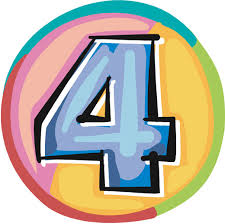记忆方法
记忆“four”的方法是将其与“for”这个词的发音相似性结合起来,形成一个图像或场景。可以将“four”想象成一个有四个部分的形状,比如一个有四个角的星星,或者是四个并列的手指。这样,每当看到“four”这个数字时,你就可以联想到这个形状,从而帮助记忆。
以上内容由AI生成, 仅供参考和借鉴
中文词源
four 四
来自PIE*kwetwer, 四,词源同cadre, tetrameter,quarter.
英语词源
- four
-
four: [OE] The distant Indo-European ancestor of English four was *qwetwōr-, which also produced Latin quattuor (whence French quatre, Italian quattro, Spanish cuatro, etc), Greek téssares, Sanskrit catvāras, Russian chetvero, and Welsh pedwar. Its Germanic descendant was *petwor-, from which come German and Dutch vier, Swedish fyra, and English four.
Amongst the word’s perhaps more surprising relatives in English are carfax ‘crossroads’ (ultimately from a post-classical Latin compound which meant literally ‘four forks’), quarantine (denoting etymologically a ‘period of 40 days’), quire ‘set of four sheets of paper’, and trapeze (literally ‘four-footed’).
=> carfax, quarantine, quire, trapeze - four (n., adj.)
- Old English feower "four; four times," from Proto-Germanic *fedwor- (cognates: Old Saxon fiuwar, Old Frisian fiower, fiuwer, Frankish *fitter-, Dutch vier, Old High German fior, German vier, Old Norse fjorir, Danish fire, Swedish fyra, Gothic fidwor "four"), from PIE *kwetwer- "four" (cognates: Sanskrit catvarah, Avestan čathwaro, Persian čatvar, Greek tessares, Latin quattuor, Oscan petora, Old Church Slavonic četyre, Lithuanian keturi, Old Irish cethir, Welsh pedwar). The phonetic evolution of the Germanic forms has not been fully explained; Watkins explains the -f- as being from the following number (Modern English five).
To be on all fours is from 1719; earlier on all four (14c.). Four-letter word as a euphemism for one of the short words generally regarded as offensive or objectionable is attested from 1923; four-letter man is recorded from 1920 (apparently as a euphemism for a shit). Compare Latin homo trium litterarum, literally "three-letter man," a euphemism for fur "a thief." A four-in-hand (1793) was a carriage drawn by four horses driven by one person; in the sense of "loosely tied necktie" it is attested from 1892. To study The History of the Four Kings (1760, compare French Livres des Quatre Rois) contains an old euphemistic slang phrase for "a pack of cards," from the time when card-playing was considered a wicked pastime for students. Slang 4-1-1 "essential information" (by 1993) is from the telephone number called to get customer information. The four-color problem so called from 1879. The four-minute mile was attained 1954.
权威例句
- 1. I went through about four years of being addicted to video games.
- 我大约有4年时间沉迷在电子游戏中。
- 2. The key issue was whether the four defendants acted dishonestly.
- 关键问题是4名被告是否存在欺诈行为。
- 3. She denied the murder of four children who were in her care.
- 她否认杀害了她所照管的4个孩子。
- 4. Four of them had gone off to find help.
- 他们中的4个人去寻求帮助了。
- 5. Remove the meat with a fork and divide it among four plates.
- 用餐叉把肉叉走,分到4个盘里。

